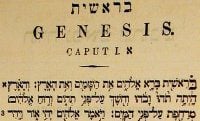 I’m spending a lot of my time writing about the idea of “context” right now, both for my book and also for a BYU paper, tentatively accepted for the 2017 Sperry Symposium. Below are a few fun things I’ve turned up recently.
I’m spending a lot of my time writing about the idea of “context” right now, both for my book and also for a BYU paper, tentatively accepted for the 2017 Sperry Symposium. Below are a few fun things I’ve turned up recently.
In the past, I’ve used the idea of scripture as a collected edition, an anthology or library, to talk about both the presence of different genres in scripture and quiet fears about “slippery slope” interpretations (see here.) It’s hardly a surprise, but recognizing the “library” nature of scripture is not original to me. Eminent Catholic scholar and priest Raymond E. Brown used it as well, in his 101 Questions and Answers on the Bible. He has a good discussion of the variety within the Bible, and I appreciate both his knowledge and how he is able to frame it for people who might find his answers difficult. He walks the scholarly/pastoral line with excellent balance.
Q. 20. What do you mean by speaking of the Bible as a library?
Often we speak of “the Bible” in the singular as if it were one book. That pays tribute to the divine origins. Nevertheless, the Bible is a collection of some 70 books…. But my “library” approach is not concerned only with the number of books; what is important is the recognition that the Bible contains books of different literary genres, written at different times and different places. Perhaps the first Old Testament books took shape 800 or 700 years before Christ, even though some of the traditions that are preserved in them were written hundreds of years earlier; the last New Testament book to be written was probably in the early second century. That is why one tends to estimate a thousand years of written composition. In this period of time, biblical authors would have been facing very different problems and would represent different stages of theological perception that would condition the way in which they reported God’s revelation. We are not to assume that the human author saw the whole issue. The part of the issue that was seen by him was shaped by what would be of help to his contemporaries. The idea that God was speaking through the human author, i.e., communicating, does not remove that limitation, because God always deals with people as they are and respects their humanity.
Q. 21. What practical effects result from considering the Bible as a collection of books in a library rather than as one book?
Here terminology has great practical effects. When somebody comes up to me and states, “The Bible says this,” my first tendency will be to respond, “Which book of the Bible?” On a given topic, one can have biblical authors responding very differently to the same issue.
Moreover, an approach to the Bible as a library affects the expectation of the readers as they open the pages of a particular author. In a modern library, books are on the shelf according to their subject matter: there is a section for history, for biography, for novels, for drama, for poetry, etc. If one walks into a library and asks for a book, the first question from the librarian will be “What kind of book?” That also is a very important question to ask in reading the Bible. Some of the most serious mistakes of biblical interpretation have flowed from an assumption, quite unwarranted, that all the books of the Bible are history. Today, books have dust jackets that tell the reader the genre of the book, and readers automatically adjust their mindset to an expectation in light of that information. No one picks up a Sherlock Holmes story and expects to read accurate history of a character who lived in London at the end of the last century. The biblical books do not come with dust jackets, and an important task of scholarship is to supply an introduction to each book that helps to identify it. People have wasted time measuring fish gullets in order to prove the historicity of the Book of Jonah. An introduction that tells the reader that this is a parable, not history, saves a good deal of confusion.
Q. 22. Don’t we believe any more in the inspiration of the Bible?
Certainly I do. And so far as I know, most centrist biblical scholars would not reject that terminology, provided its implications are understood correctly. The very fact that this question has been asked after I explained that there are books of different kinds or genres in the Bible suggests that the implication of that fact for inspiration is not clear. Often it is thought that inspiration makes everything history. It does not; there can be inspired poetry, drama, legend, fiction, etc. If the Book of Jonah is a parable and not history, then God’s inspiration makes it an inspired parable. The truth that it conveys about God’s desire to convert all nations to the recognition of His Name and to a moral way of life that will bring them happiness is a truth that we can accept as God’s inspired word for us. Inspiration does not mean that we have to believe that a historical figure named Jonah was swallowed by a large fish. We would have to deal with the factuality of that only if the Book of Jonah were inspired history. Similarly, if the first chapters of Genesis are not classified in the branch of the library called science, but in the branch of the library called religious lore and legends, we would still accept the creation of the world by God as the inspired truth conveyed by those chapters. We would not, however, have to accept the Genesis description as a scientific account of the origins of the world. It could be an account that the author learned from the legendary imaginings of his people and of other peoples and that he used to convey the truth he was really interested in, namely, that God is sovereign of all and creator of the universe. Thus there is no contradiction between acceptance of inspiration and acceptance of different literary genres, or forms, or styles in the Bible.
Q. 23. Surely it scandalizes people to hear that not everything told us in the Bible happened literally.
I am not certain how universally true that is, since increasingly we are getting a more sophisticated audience, at least in the First World. I suspect that by osmosis from elementary and high school education, people have already realized that parts of the Bible are not literal accounts of factual history. Whether it scandalizes them when that is said under church auspices probably depends on the way in which it is said.
I have never thought it helpful for someone to get up in a pulpit or classroom and announce that this or that biblical incident never happened. My favorite example of bad taste, bad pedagogy, and perhaps bad theology, is for someone in a church setting to proclaim, “There were no magi.” I know quite well that there are serious reasons for doubting the literal historicity of the incident of the magi in the Matthean infancy narrative…. Nevertheless, the statement made with absolute surety that there were no magi goes beyond what biblical scholarship can prove. It is very difficult to support with evidence such an absolute negative, and so even on a purely scholarly basis one should not state it. Pedagogically, I do not see how such a negative bit of knowledge can be spiritually helpful to the audience, and making statements in a church setting presumably has the purpose of helping people to grow in knowledge of God. How would they be brought closer to God by knowing that there were no magi? Theologically, such a negative statement distracts from the true import of the story and by implication conveys the idea that this story is primarily concerned with communicating facts.
In my judgment, the way to preach or teach the magi story in a religious setting is to present the beautiful Old Testament background of wise men coming from the East bringing God’s revelation about Israel. (I’ll not go into that background, but it lies in the heart of the Balaam story in the Book of Numbers.) In this way the audience can come to understand Matthew’s message that these Gentiles, drawing upon a source of knowledge available to them, namely the reading of the stars, have come to adore God, even if they still require guidance of the Hebrew Scriptures to find out precisely where the King of the Jews has been born. When one shows the audience the extent to which the Matthean infancy story is retelling symbolically stories from the Old Testament, one may be conveying to them by implication that this story of the magi is not literal history. But one has not made a point of the lack of historicity, and one is not distracting from the story’s theological value. And so to answer your implied question, I think there is nothing scandalous about preaching or teaching each biblical book in its proper literary genre, history as history, parable as parable, when the preacher or teacher has sensitivity to both the purpose of the book and the purpose of the communication.
Let me point out an implication of this, even if it may not have been an implication of your question. Sometimes, because they fear scandal, some would say that it is better to treat a nonhistorical narrative as history and thus cause no problem. That is a dangerous misconception. God’s truth should be served by nothing less than the best of human perception, and we endanger acceptance of divine truth when we teach anybody something that by our best scholarly standards is thought to be false. Sooner or later, those who hear the preacher treating Jonah as if it were history, or the first chapters of Genesis as if they were science, will come to realize the falsity of that presentation and, as a consequence, may reject the inspired divine truth contained in those chapters. In treating any passage of Scripture one need not raise problems that the audience has no way of understanding or of suspecting; but a discreet silence about extremely complicated issues is not the same as teaching or preaching something thought to be false. In preaching the infancy narratives (as distinct from giving a course in a university) I do not go into all the complications of historicity. But neither do I explicitly or implicitly suggest that all the incidents therein are history and must be believed. We probably need to be careful about underestimating the sophistication of the audience. I wonder if one were speaking to a fifth grade grammar school class about the star that rose in the East and came toward Jerusalem and came to settle over Bethlehem, would there not already be on the lips of the children a question as to whether all this happened, or is it “just a story.” The challenge to the teacher or preacher may be to walk a middle line between affirming that all this happened literally and suggesting that it is just a story. It is a story in which God’s inspired truth is communicated to us.
I frequently recommend the works of Robert Alter, a scholar of Hebrew and literature. Revisiting a topic he covered in the Art of Biblical Narrative (1981), in 1983 he wrote about the necessity of understanding literary conventions in the Bible.
It is through our tacit awareness of how such conventions are supposed to operate that we are able to make sense American literature. In European and American fiction, for example, of the past six decades, one encounters a common convention of interior monologue in which there are sudden backward jumps in time with no explicit narratorial indication of the transition (not even the minimal “he remembered”), though there may be some typographical signal, like a shift into italics. Most of us have read enough novels where this convention is present so that we are not likely to have much difficulty deciphering the unexplained shifts. An eighteenth-century reader would be rather puzzled by such features of a modern text; a reader whose experience of narrative was entirely limited to Homer and the Bible would be quite baffled, might even be tempted to conclude that the text was incoherent, that two or more manifestly disparate texts had somehow been stitched together.If we now turn the chronology of this exegetical dilemma around to the usual retrospective order in which interpretation works historically, we may see something of our difficulty as moderns in making sense of biblical narrative. After nearly three millennia, many of the organizing conventions of biblical narrative have been forgotten, overlaid with later logics, later ways of producing and deciphering texts, and perhaps some of these conventions are now beyond recovery.
I’ve written about convention and genre multiple times, but I always appreciate the examples and analogies used by others in making this concept clear.
As always, you can help me pay my tuition here, or you can support my work through making your regular Amazon purchases through this Amazon link. You can also get updates by email whenever a post goes up (subscription box on the right). If you friend me on Facebook, please drop me a note telling me you’re a reader. I tend not to accept friend requests from people I’m not acquainted with.











